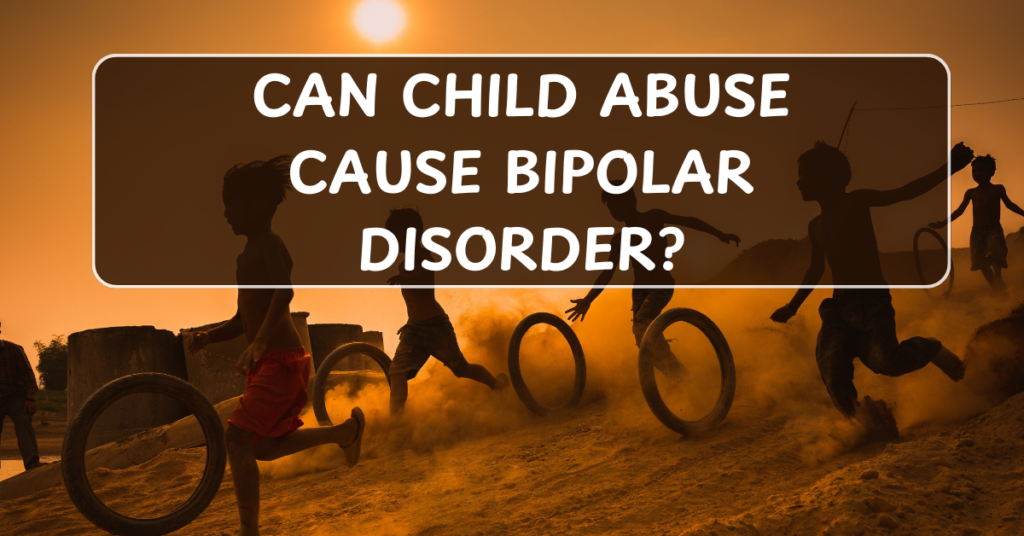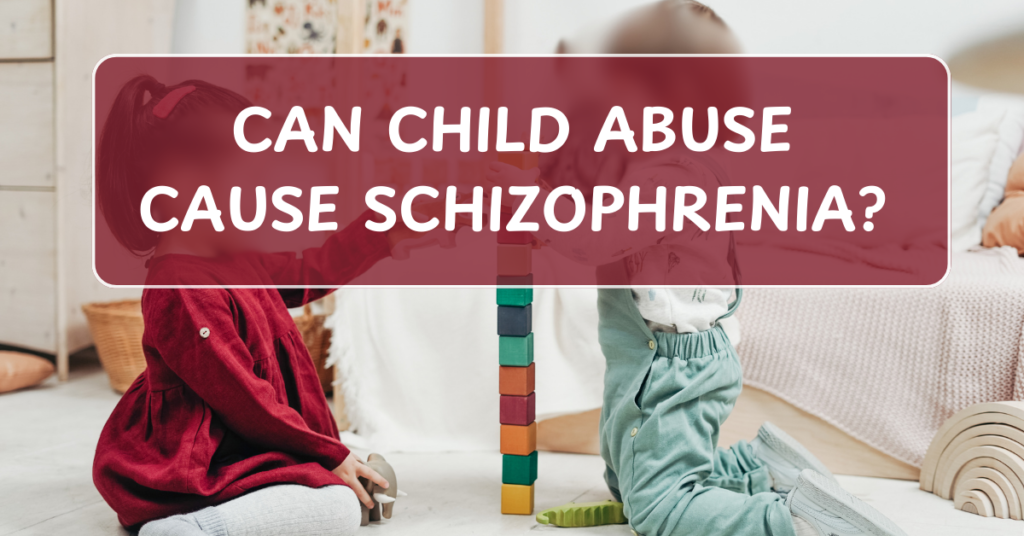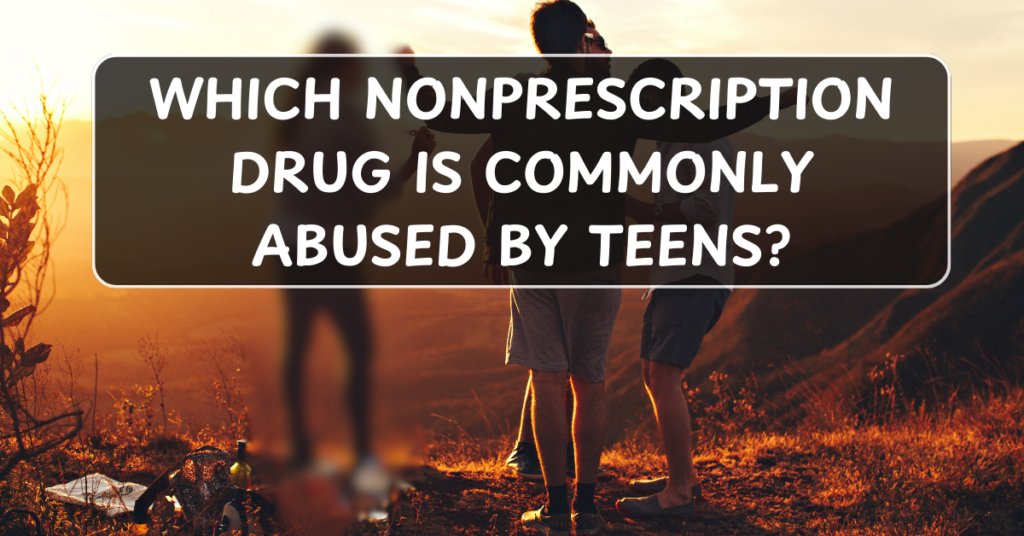
Bipolar disorder, formerly known as manic-depressive illness, is a mental health condition that causes extreme mood swings, including periods of elevated or manic moods and episodes of depression. It is a serious condition that affects a person’s ability to function in daily life, and it can have a significant impact on relationships, work, and overall well-being.
The causes of bipolar disorder are complex and not entirely understood. However, it is believed to arise from a combination of genetic, biological, and environmental factors. One common question that arises is whether childhood abuse can cause bipolar disorder. In this post, we will explore the relationship between child abuse and bipolar disorder, clarify misconceptions, and provide a deeper understanding of how abuse may contribute to the development of mood disorders like bipolar disorder.
Understanding Bipolar Disorder
Bipolar disorder is characterized by extreme mood swings, which typically include:
- Manic or Hypomanic Episodes: These episodes are marked by abnormally elevated or irritable moods, increased energy, racing thoughts, impulsive behaviors, and decreased need for sleep. In severe cases, mania can cause psychosis (loss of touch with reality).
- Depressive Episodes: During these periods, individuals may feel hopeless, sad, or empty, with symptoms such as low energy, lack of interest in activities, changes in sleep and appetite, and thoughts of death or suicide.
Bipolar disorder is typically diagnosed in late adolescence or early adulthood, and the cause is thought to be a combination of genetic predisposition, brain chemistry, and environmental factors.
How Does Childhood Abuse Relate to Bipolar Disorder?
While childhood abuse does not directly cause bipolar disorder, it is an environmental factor that can influence the development of mood disorders, including bipolar disorder, in individuals who are genetically vulnerable. Childhood abuse—whether physical, emotional, or sexual—can have lasting effects on a person’s mental and emotional health, potentially increasing the risk of developing bipolar disorder or other mood disorders later in life.
Here are some ways in which childhood abuse may be linked to the development of bipolar disorder:
1. Impact on Brain Development
Childhood abuse, especially when experienced at a young age, can affect the development of the brain. Chronic stress from abuse can alter brain structure and function, particularly areas involved in mood regulation, emotional processing, and memory, such as the prefrontal cortex, hippocampus, and amygdala. These changes may increase vulnerability to mood disorders, including bipolar disorder, by disrupting the brain’s ability to manage emotions effectively.
2. Trauma and Stress Response
Abuse during childhood can cause prolonged exposure to trauma and chronic stress, which can interfere with the body’s stress response system. The brain releases chemicals such as cortisol during stressful situations. Over time, elevated cortisol levels due to ongoing stress and trauma can lead to changes in the brain’s wiring, making an individual more susceptible to mental health disorders. Trauma can also contribute to emotional dysregulation, which is a key feature in bipolar disorder.
3. Genetic Vulnerability and Environmental Triggers
Bipolar disorder is thought to have a strong genetic component, meaning that individuals with a family history of the condition are at an increased risk of developing it. However, environmental factors such as childhood abuse can act as triggers for those who are genetically predisposed to the disorder. For instance, a child who has a genetic vulnerability to bipolar disorder may be more likely to develop the condition if exposed to significant trauma, such as abuse, during critical stages of brain development.
4. Increased Risk of Other Mental Health Issues
Childhood abuse is associated with an increased risk of developing a range of mental health conditions, including depression, anxiety, PTSD, and substance abuse. These conditions can overlap with or trigger mood disorders like bipolar disorder, making it harder for a person to manage their emotional state and increasing the likelihood of experiencing the extreme mood swings characteristic of bipolar disorder.
Research Findings: Child Abuse and Bipolar Disorder
Research has shown that childhood trauma, including abuse, can increase the risk of developing bipolar disorder, especially in individuals with a genetic predisposition to the condition.
- One study found that individuals with bipolar disorder who had experienced childhood abuse or neglect were more likely to have an earlier onset of the disorder, more severe symptoms, and a greater likelihood of experiencing rapid mood swings.
- Another study highlighted that early childhood trauma, particularly emotional or physical abuse, can contribute to the development of mood disorders, including bipolar disorder, later in life. The study suggested that the trauma may act as a triggering factor, influencing the onset and course of the disorder in those who are genetically vulnerable.
While these studies suggest a link between childhood abuse and bipolar disorder, it is important to note that not everyone who experiences childhood abuse will develop bipolar disorder. Mental health conditions are highly individual, and the development of bipolar disorder is influenced by many factors, including genetics, biology, and environmental stressors.
How Child Abuse Affects the Development of Mood Disorders
While childhood abuse does not directly cause bipolar disorder, it can contribute to the development of mood disorders in the following ways:
- Emotional and Psychological Trauma: Abuse can leave lasting emotional scars, leading to difficulty managing emotions, maintaining stable relationships, and coping with stress. These issues can increase the risk of developing mood disorders, including bipolar disorder.
- Difficulty with Emotional Regulation: Abuse can impair a person’s ability to regulate their emotions, leading to intense mood swings, anger, or sadness. Over time, these emotional difficulties may develop into full-blown mood disorders like bipolar disorder.
- Chronic Stress: Abuse often leads to chronic stress, which has a profound impact on both physical and mental health. Chronic stress can trigger the onset of mood disorders, including depression and mania, and may exacerbate existing symptoms of bipolar disorder.
Is Child Abuse a Sole Cause of Bipolar Disorder?
No, child abuse is not a sole cause of bipolar disorder. Bipolar disorder is a complex condition with multiple contributing factors. While childhood abuse can increase the risk of developing mood disorders, it is only one of many potential triggers. Genetic factors, chemical imbalances in the brain, and other environmental influences (such as stressful life events, substance abuse, or traumatic experiences) also play a role in the development of bipolar disorder.
Conclusion
Child abuse does not directly cause bipolar disorder, but it can be an important environmental factor that increases the risk of developing this and other mood disorders, especially in individuals who have a genetic predisposition. Childhood abuse can affect brain development, emotional regulation, and stress responses, all of which can contribute to the onset of bipolar disorder later in life.
If you or someone you know has experienced childhood abuse and is struggling with emotional regulation, mood swings, or symptoms of bipolar disorder, it is important to seek professional help. Early intervention, therapy, and appropriate treatment can make a significant difference in managing symptoms and improving long-term mental health outcomes.


